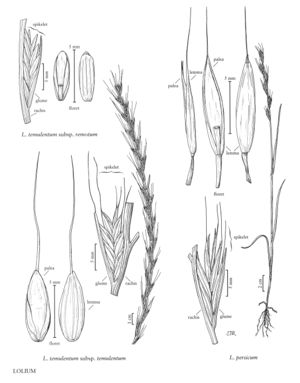Difference between revisions of "Lolium temulentum subsp. temulentum"
FNA>Volume Importer |
FNA>Volume Importer |
||
| Line 16: | Line 16: | ||
-->{{Treatment/Body | -->{{Treatment/Body | ||
| − | |discussion=<p>Lolium temulentum subsp. temulentum is found occasionally in disturbed sites throughout much of the Flora region. It is native to the Eastern Hemisphere, where it is known only as a weed, especially of grain fields. Awn presence or absence and length vary, and have no taxonomic significance.</p><!-- | + | |discussion=<p><i>Lolium temulentum </i>subsp.<i> temulentum</i> is found occasionally in disturbed sites throughout much of the Flora region. It is native to the Eastern Hemisphere, where it is known only as a weed, especially of grain fields. Awn presence or absence and length vary, and have no taxonomic significance.</p><!-- |
| − | --><p>The seeds sometimes become infected with an endophytic fungus, assumed to be the source of the toxic pyrrolizidine alkaloids loline, 6-methyl loline, and lolinine, but not temuline, which is now considered an artifact of isolation (Dannhardt and Steindl 1985). Because primitive agricultural practices could not separate seeds of Lolium temulentum from those of wheat, infected seeds often resulted in poisonous flour.</p> | + | --><p>The seeds sometimes become infected with an endophytic fungus, assumed to be the source of the toxic pyrrolizidine alkaloids loline, 6-methyl loline, and lolinine, but not temuline, which is now considered an artifact of isolation (Dannhardt and Steindl 1985). Because primitive agricultural practices could not separate seeds of <i>Lolium temulentum</i> from those of wheat, infected seeds often resulted in poisonous flour.</p> |
|tables= | |tables= | ||
|references= | |references= | ||
| Line 26: | Line 26: | ||
-->{{#Taxon: | -->{{#Taxon: | ||
name=Lolium temulentum subsp. temulentum | name=Lolium temulentum subsp. temulentum | ||
| − | |||
|authority=L. | |authority=L. | ||
|rank=subspecies | |rank=subspecies | ||
| Line 37: | Line 36: | ||
|publication year= | |publication year= | ||
|special status= | |special status= | ||
| − | |source xml=https:// | + | |source xml=https://jpend@bitbucket.org/aafc-mbb/fna-data-curation.git/src/f50eec43f223ca0e34566be0b046453a0960e173/coarse_grained_fna_xml/V24/V24_658.xml |
|subfamily=Poaceae subfam. Pooideae | |subfamily=Poaceae subfam. Pooideae | ||
|tribe=Poaceae tribe Poeae | |tribe=Poaceae tribe Poeae | ||
Revision as of 20:23, 16 December 2019
Blades (1.5)3-10(12) mm wide. Spikes 5-40 cm, with 5-26 spikelets; rachises rather stout. Spikelets 8-28 mm long, 3-8 mm wide. Glumes (5.5)7-28 mm, from 3/4 as long as to longer than the florets, somewhat indurate; lemmas 4.5-8.5 mm long, 1.5-3 mm wide, unawned or awned. awns to 23 mm, attached 0.5-2 mm below the apices. Caryopses (3.8)4-7 mm long, (1)1.5-3 mm wide.
Discussion
Lolium temulentum subsp. temulentum is found occasionally in disturbed sites throughout much of the Flora region. It is native to the Eastern Hemisphere, where it is known only as a weed, especially of grain fields. Awn presence or absence and length vary, and have no taxonomic significance.
The seeds sometimes become infected with an endophytic fungus, assumed to be the source of the toxic pyrrolizidine alkaloids loline, 6-methyl loline, and lolinine, but not temuline, which is now considered an artifact of isolation (Dannhardt and Steindl 1985). Because primitive agricultural practices could not separate seeds of Lolium temulentum from those of wheat, infected seeds often resulted in poisonous flour.
Selected References
None.
